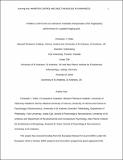Files in this item
Inhibitory control and cue relevance modulate chimpanzees’ (Pan troglodytes) performance in a spatial foraging task
Item metadata
| dc.contributor.author | Völter, Christoph J. | |
| dc.contributor.author | Tinklenberg, Brandon | |
| dc.contributor.author | Call, Josep | |
| dc.contributor.author | Seed, Amanda M. | |
| dc.date.accessioned | 2022-04-04T14:30:10Z | |
| dc.date.available | 2022-04-04T14:30:10Z | |
| dc.date.issued | 2022-03-24 | |
| dc.identifier | 278577927 | |
| dc.identifier | dfefa240-7d63-42eb-ad8a-881fabc3f9e1 | |
| dc.identifier | 000772150300001 | |
| dc.identifier | 85130608624 | |
| dc.identifier.citation | Völter , C J , Tinklenberg , B , Call , J & Seed , A M 2022 , ' Inhibitory control and cue relevance modulate chimpanzees’ ( Pan troglodytes ) performance in a spatial foraging task ' , Journal of Comparative Psychology , vol. Advance online . https://doi.org/10.1037/com0000313 | en |
| dc.identifier.issn | 0735-7036 | |
| dc.identifier.other | RIS: urn:30DF599E78F5B7C925147D28D4ED130E | |
| dc.identifier.other | RIS: 2022-46599-001 | |
| dc.identifier.other | ORCID: /0000-0002-3867-3003/work/110911823 | |
| dc.identifier.other | ORCID: /0000-0002-8597-8336/work/110912006 | |
| dc.identifier.uri | https://hdl.handle.net/10023/25138 | |
| dc.description | This project has received funding from the European Research Council under the European Union’s Horizon 2020 research and innovation program (Grant Agreement 639072). Brandon Tinklenberg was supported by a grant from the Social Sciences and Humanities Research Council of Canada (SSHRC 435-2016-1051). | en |
| dc.description.abstract | Inhibition tasks usually require subjects to exert control to act correctly when a competing action plan is prepotent. In comparative psychology, one concern about the existing inhibition tasks is that the relative contribution of inhibitory control to performance (as compared to learning or object knowledge) is rarely explicitly investigated. We addressed this problem by presenting chimpanzees with a spatial foraging task in which they could acquire food more efficiently by learning which objects were baited. In Experiment 1, we examined how objects that elicited a prepotent approach response, transparent cups containing food, affected their learning rates. Although showing an initial bias to approach these sealed cups with visible food, the chimpanzees learned to avoid them more quickly across sessions compared to a color discrimination. They also learned a color discrimination more quickly if the incorrect cups were sealed such that a piece of food could never be hidden inside them. In Experiment 2, visible food of 2 different types was sealed in the upper part of the cups: 1 type signaled the presence of food reward hidden underneath; the cups with the other type were sealed. The chimpanzees learned more quickly in a congruent condition (the to-be-chosen food cue matched the reward) than in an incongruent condition (the to-be-avoided food cue matched the reward). Together, these findings highlight that performance in inhibition tasks is affected by several other cognitive abilities such as object knowledge, memory, and learning, which need to be quantified before meaningful comparisons can be drawn. | |
| dc.format.extent | 16 | |
| dc.format.extent | 1372839 | |
| dc.language.iso | eng | |
| dc.relation.ispartof | Journal of Comparative Psychology | en |
| dc.subject | Animal Learning | en |
| dc.subject | Comparative Psychology | en |
| dc.subject | Reinforcement | en |
| dc.subject | Cognitive Control | en |
| dc.subject | Executive Function | en |
| dc.subject | Animal Foraging Behavior | en |
| dc.subject | Chimpanzees | en |
| dc.subject | Rewards | en |
| dc.subject | BF Psychology | en |
| dc.subject | DAS | en |
| dc.subject.lcc | BF | en |
| dc.title | Inhibitory control and cue relevance modulate chimpanzees’ (Pan troglodytes) performance in a spatial foraging task | en |
| dc.type | Journal article | en |
| dc.contributor.sponsor | European Research Council | en |
| dc.contributor.institution | University of St Andrews. School of Psychology and Neuroscience | en |
| dc.contributor.institution | University of St Andrews. Centre for Social Learning & Cognitive Evolution | en |
| dc.contributor.institution | University of St Andrews. Institute of Behavioural and Neural Sciences | en |
| dc.contributor.institution | University of St Andrews. ‘Living Links to Human Evolution’ Research Centre | en |
| dc.identifier.doi | 10.1037/com0000313 | |
| dc.description.status | Peer reviewed | en |
| dc.identifier.grantnumber | 639072 | en |
This item appears in the following Collection(s)
Items in the St Andrews Research Repository are protected by copyright, with all rights reserved, unless otherwise indicated.

